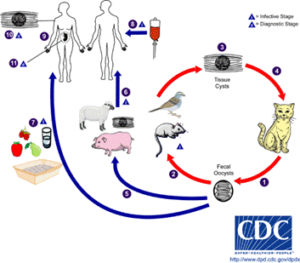Toxoplasmosis is an infection by a protozoal parasite, Toxoplasma gondii, which can be shed in the feces of felines. Cats pick up this parasite from eating infected small mammals or birds, or from contaminated soil or water.
The parasite can be found in the cat’s stool as soon as 3 days after infection and continue to be shed for up to 20 days. These feces can become infectious to most animals, including humans, within 1-5 days and stay infective for several months.
After being exposed to the Toxoplasma organism, cats will develop an immunity allowing them to shed the infected feces for only one period in their lifetime.
Animals other than cats do not shed the parasite in their stool. Instead, the parasite is forced into the tissues of the exposed animal and turns into a cyst form. Individuals with a healthy immune system typically never develop clinical signs. Humans and other animals can be exposed to the parasite through contact (inhalation or ingestion) with infected feces, by eating undercooked meat that contains they cysts (especially pork, lamb, and venison per the CDC), or from eating produce that was grown in contaminated soil.
Signs of infection depend on where the cysts damage tissue and can include:
- Generally – lethargy, depression, weight loss, lack of appetite, fever
- Eye – inflammation or discharge
- Stomach/intestines – vomiting, diarrhea, jaundice, and abdominal pain
- Neurological – staggering, weakness, paralysis, seizures, tremors, muscle pain
- Respiratory – coughing and difficulty breathing.
A blood test is available for both humans and cats to diagnose an infection. Treatment usually consists of a combination of anti-protozoal medications.
When a pregnant woman is exposed to Toxoplasma, the cysts can cause damage to the fetus.
Prevention:
- Scoop the cat litter box daily to avoid being exposed to infectious cysts.
- Wear disposable plastic gloves or wash hands thoroughly when changing cat litter boxes.
- Dispose cat litter/feces in the garbage – not in the toilet or outside in the soil.
- Use gloves when gardening or working with soil.
- Thoroughly cook all meat.
- Wash knives and cutting boards.
- Wash all produce.
- Wash hands after cleanup.

For more information on human health risks and prevention, go to www.cdc.gov

